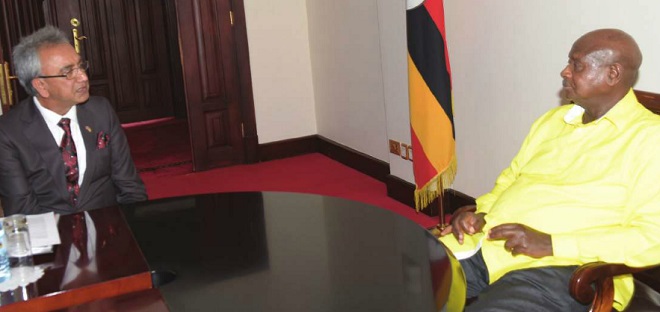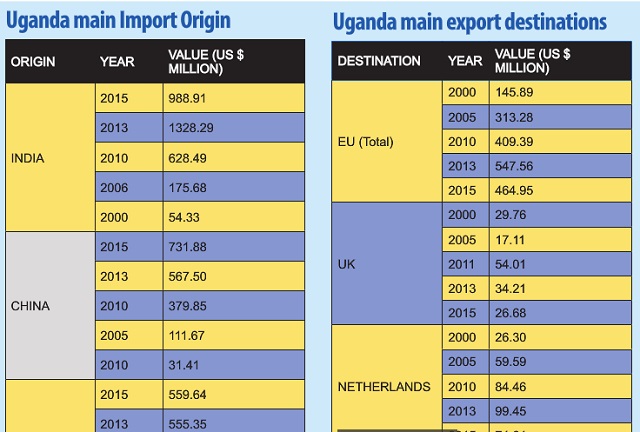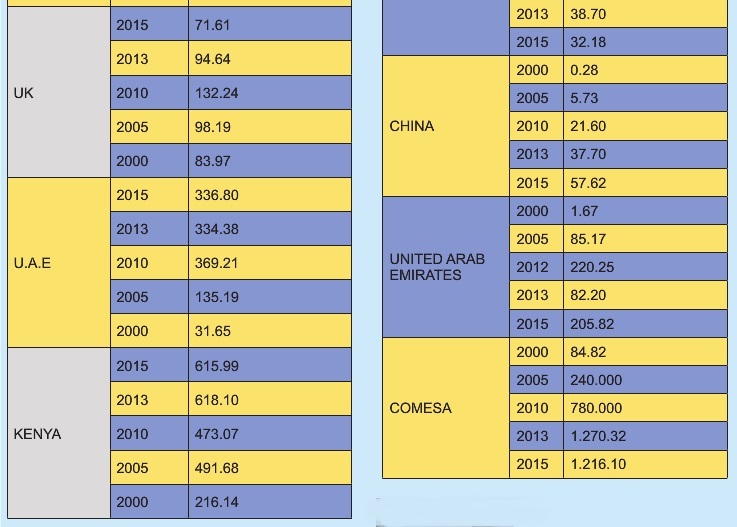
The UK is the 9th largest export economy in the world. In 2014, it exported $472 billion and imported $663 billion. The top exports of the UK are cars, gold, crude petroleum, refined petroleum and packaged medicaments. Uganda is not among the UK’s to export destinations which are the United States, Germany, the Netherlands, Switzerland and France.
The UK’s top imports are once again cars, crude petroleum, refined petroleum, packaged medicaments and computers. The top import origins are Germany, China, the Netherlands, the United States, and France ($41.5B). Therefore, these will most like remain the UK’s priority trading partners.
Despite its lowly placement, the EU is a major trading partner for Uganda and accounted for 15.4% of exports in 2013 and 17.8% in 2014. Only COMESA countries and some other African countries were ahead of the EU, according to the Uganda Bureau of Statistics data of 2015.
In 2014, the export earnings from EU stood at US$477.6 million compared to the value of US$ 436.1 million recorded in the previous year.
In the EU, the main destinations for Uganda’s exports in 2014 were Italy, Belgium, Netherlands, and Germany.
The Asian continent nations are the main source of Uganda’s imports and accounted for 55.3% market share in 2013 and 55% in 2014.
But some imports originate from the EU countries, especially from France and the Netherlands. The imports from the EU have, however, been falling; from 11.7% in 2013 to 10.3% in 2014.
The value of imports from the UK has been declining from US$134 million in 2010 to US$99 in 2014. Over the same period, imports from the EU have declined from US$728 million to US$630 million. Meanwhile, the value of imports from China has risen from US$415 million to US$740 million over the same time and India, from US$685 million to US$1.5 billion.
UK fights back
But the UK has remained determined to have its presence felt in Uganda.
Just this June, between June 21 and 23, the newly appointed UK Prime Ministers Trade Envoy to Uganda, Lord Dolar Amarshi Popat, visited Uganda and had a meeting with President Yoweri Museveni on June 22 at State House Entebbe.
Information from State House did not, however, announce any major trade brake throughs but spoke generally of discussion about “widening the trade relationship”. President Museveni suggested that British business people could invest in packaging including paper, plastics, and glass, and veterinary drugs. Lord Popat assured Museveni that is his job “to see that there is trade between the UK and Uganda”.
Lord Popat also met several government ministers and the Executive Director of Kampala Capital City Authority (KCCA) and was hosed to a British business breakfast forum at the Kampala Serena Hotel where he interacted with key members of Uganda’s business community.
Lord Popat, a businessman of longstanding and prominency in the UK was born in Uganda. He has previously served as a UK Minister for Trade. Earlier in April, a Ugandan business delegation had travelled on an official visit to the UK. The visit was organized by Barclays Business Group and Popat.


General decline of EU
The declining influence of UK and EU trading has not occurred only in Uganda.
While Europe has remained as Africa’s largest trading partner, Africa’s trade with Asia has been growing at a faster pace. It grew by 22% over the decade ending 2011, while trade with Europe grew by only 15%. Figures for the last five years have seen further declines for the UK/EU and more rising for Asia.
Europe’s contribution to Africa’s manufactured imports declined from 32% in 2002 to 23% in 2011, while Asia’s share increased from 13% to 22% during the same period.
As a result, Africa’s growing trade with Asia, especially China, has been a major concern to Europe.
Meanwhile, Africa’s share of global trade has increased steadily, from $277 billion (2.3%) in 2001 to about $1 trillion (4.6%) in 2011, according to the UN Conference on Trade and Development. Uganda and several sub-Saharan Africa (SSA) countries have adopted a diversification strategy regarding their trading partners and the goods and services involved. There has been a growth of so-called non-tradition exports. Now, many of them are talking about venturing into manufacturing – not merely as an import substitution strategy – but with an eye to export finished products.
It remains to be seen how recent developments in the UK/EU, China’s slowing down, and the general decline in commodity prices with affect African economies and Uganda, in particular.
 The Independent Uganda: You get the Truth we Pay the Price
The Independent Uganda: You get the Truth we Pay the Price


